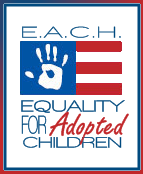Adoption Glossary
Adoption almost has its own language. Here are the some common terms that pop up during adoption, and what they really mean.
Types of Adoption
An adoption can be one or more of these three types:
Open
An open adoption keeps both birthparents and parents in contact with each other. This can vary greatly in scope, and involves anything from occassional pictures and letter to scheduled visits with the birthparents. This type of adoption is becoming more popular. It can also be emotionally taxing for all parents involved, and possibly confusing for the child. However, this form of adoption can help to prevent confusion for the child as he grows older, because nothing has been hidden from the start.
Closed
A closed adoption provides no commication between the birthparents and the parents. This type of adoption allows each set of parents to move on with their lives without looking back, and never creates any ties that would otherwise have to be broken. This situation elminates possible confusion for the child having to cope with two sets of parents, as in an open adoption.
Private
A private adoption is one in which the no adoption agency is involved. The birthparents and parents deal directly with each other, though often still with legal assistance.
International
Nothing tricky here. An international adoption means the child lives in a different country from the parents.
Special Needs
Many adoptions involve special needs children. This term includes a much wider range of needs than you might expect. Physically and mentally handicapped children obviously fall into the category, but their handicaps range tremendously from something as simple as an "outie" belly button, to missing limbs.
Sibling groups are an important special needs category. These children not necessarily handicapped in any way, but just want to stay together. This classifies them as special needs.
Biracial
Children whose birthparents are of different races. Unfortunately, these children are often not as sought after as single-race children.
Family Terms
Birth parents
The couple that had the baby. Often they are called the "real parents," which has a negative connotation toward the parents, as if they are fake. These are the people who decide to place their child for adoption.
Parents
The couple searching for a child. They are sometimes called "adoptive parents," which limits the reality of their parental relationship with the child.
Adoption Process
Placing for adoption
The birthparents decide to make their child available for another family to adopt. This decision can be extremely difficult, and friends and family around the birthparents often add pressure both for and against such a decision. When deciding what to do, the birthparents will often use the services of a social worker.
Home study
One of the first steps for the future parents is to schedule a home study. This is usually a requirement of the state, and is intented to verify that the couple is able to parent.
Adoption agency
A social services organization that provides counseling and other assistance to birthparents. If the birthparents decide to place their child for adoption, the agency can also help them choose the new parents. A state social services department can also function much like an agency.
Social Worker
A person who deals directly with the birthparents, and tries to help and counsel them. The worker does not push adoption on the birthparents, but provides the service if desired. This type of person will also perform the home study for the future parents. In Christian agencies, the social worker (here more often called a counselor) will approach the situation in a Biblical way.
Lawyer
There are many laws involved in the adoption process, and most times it is a good idea to find a lawyer who knows them. Adoptions from other states or countries are much more complicated than in-state adoptions, and can require multiple lawyers.
